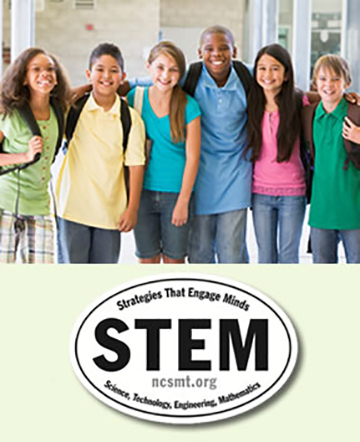The SMT Center believes that STEM is more than Science, Technology, Engineering and Mathematics. It’s Strategies That Engage Minds through hands-on, active involvement in science, technology, engineering and mathematics education.
The common assumption for the acronym STEM is for the disciplines of science, technology, engineering, and mathematics. While these are critical fields of endeavor, we know that everyone will not become a scientist, a mathematician, an engineer, or a computer programmer. What we can do is provide students with a method of thinking to enable them to problem solve, creatively explore options, and to engage innovatively. This is why the SMT Center refers to STEM as Strategies that Engage Minds.
In our efforts to promote and support science, mathematics, and technology education in North Carolina’s schools, it has become clear that we must first create the conditions in our schools where Strategies That Engage Minds can thrive. In order to do this we must provide our students with adult skills to deal with real world information, and allow them to demonstrate performance and learn to independently resolve problems.
The SMT Center serves as a catalyst for innovation and change in education by providing educational services, such as developing and conducting conferences, seminars and teacher development workshops in STEM preK-12 education and distributing relevant training materials; advocating for research-based instructional programs in schools, providing tools, learning methods, and technical help to educators; and recruiting community and business leaders to encourage and promote advanced science and mathematics learning at all ages by providing a website featuring educational information in the STEM fields.
By enabling Strategies that Engage Minds we teach our students to be independent not dependent learners; to be thoughtful not thoughtless; and perhaps, most importantly, to know what to do when they don’t know what to do.
